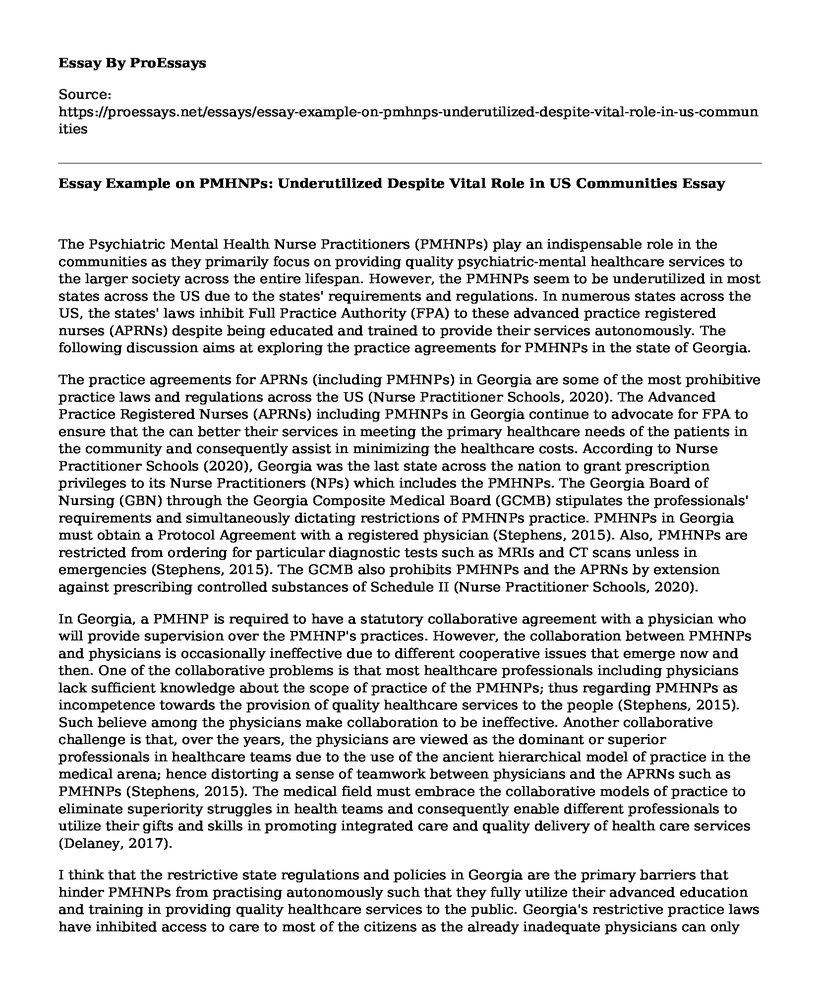The Psychiatric Mental Health Nurse Practitioners (PMHNPs) play an indispensable role in the communities as they primarily focus on providing quality psychiatric-mental healthcare services to the larger society across the entire lifespan. However, the PMHNPs seem to be underutilized in most states across the US due to the states' requirements and regulations. In numerous states across the US, the states' laws inhibit Full Practice Authority (FPA) to these advanced practice registered nurses (APRNs) despite being educated and trained to provide their services autonomously. The following discussion aims at exploring the practice agreements for PMHNPs in the state of Georgia.
The practice agreements for APRNs (including PMHNPs) in Georgia are some of the most prohibitive practice laws and regulations across the US (Nurse Practitioner Schools, 2020). The Advanced Practice Registered Nurses (APRNs) including PMHNPs in Georgia continue to advocate for FPA to ensure that the can better their services in meeting the primary healthcare needs of the patients in the community and consequently assist in minimizing the healthcare costs. According to Nurse Practitioner Schools (2020), Georgia was the last state across the nation to grant prescription privileges to its Nurse Practitioners (NPs) which includes the PMHNPs. The Georgia Board of Nursing (GBN) through the Georgia Composite Medical Board (GCMB) stipulates the professionals' requirements and simultaneously dictating restrictions of PMHNPs practice. PMHNPs in Georgia must obtain a Protocol Agreement with a registered physician (Stephens, 2015). Also, PMHNPs are restricted from ordering for particular diagnostic tests such as MRIs and CT scans unless in emergencies (Stephens, 2015). The GCMB also prohibits PMHNPs and the APRNs by extension against prescribing controlled substances of Schedule II (Nurse Practitioner Schools, 2020).
In Georgia, a PMHNP is required to have a statutory collaborative agreement with a physician who will provide supervision over the PMHNP's practices. However, the collaboration between PMHNPs and physicians is occasionally ineffective due to different cooperative issues that emerge now and then. One of the collaborative problems is that most healthcare professionals including physicians lack sufficient knowledge about the scope of practice of the PMHNPs; thus regarding PMHNPs as incompetence towards the provision of quality healthcare services to the people (Stephens, 2015). Such believe among the physicians make collaboration to be ineffective. Another collaborative challenge is that, over the years, the physicians are viewed as the dominant or superior professionals in healthcare teams due to the use of the ancient hierarchical model of practice in the medical arena; hence distorting a sense of teamwork between physicians and the APRNs such as PMHNPs (Stephens, 2015). The medical field must embrace the collaborative models of practice to eliminate superiority struggles in health teams and consequently enable different professionals to utilize their gifts and skills in promoting integrated care and quality delivery of health care services (Delaney, 2017).
I think that the restrictive state regulations and policies in Georgia are the primary barriers that hinder PMHNPs from practising autonomously such that they fully utilize their advanced education and training in providing quality healthcare services to the public. Georgia's restrictive practice laws have inhibited access to care to most of the citizens as the already inadequate physicians can only supervise eight or fewer PMHNPs at a given time. Also, some of the insurance bodies/companies do not recognize NPs whenever they are not under the supervision of a qualified physician, and they do not reimburse the PMHNPs for the services they provide (Nurse Practitioner Schools, 2020). Adjustments to Georgia restrictive practice laws should be made to grant FPA to PMHNPs; thus making them practice independently in their day-to-day activities.
My plan to address PMHNPs practice challenges in Georgia will involve three steps. The first approach will be to give FPA to PMHNPs to ensure that they can comprehensively utilize their advanced education and training in providing psychiatric mental-health services to the citizens. The effort will promote access care to the public and facilitate a reduction of healthcare costs (Stephens, 2015). The second step will demand the insurance companies to recognize APRNs, including PMHNPs as primary healthcare providers and simultaneously establish the ways of reimbursing these professionals appropriately (Stephens, 2015). The final step will focus on developing and implementing collaborative models of practice to eliminate the traditional hierarchical approaches such that teamwork will be enhanced among different healthcare professionals in a team, and more importantly promote integrated care (Delaney, 2017). The collaborative models of practice will bring equality among the members of a multi-disciplinary team and enable each professional utilizes his or her talents and skills to the fullest.
References
Delaney, K. R. (2017). Psychiatric mental health nursing advanced practice workforce: Capacity to address shortages of mental health professionals. Psychiatric Services, 68:9. Retrieved from https://ps.psychiatryonline.org/doi/pdf/10.1176/appi.ps.201600405
Nurse Practitioner Schools. (2020). Georgia NPs: The Fight for Full Practice Authority. Retrieved from https://www.nursepractitionerschools.com/blog/georgia-np-full-practice-authority/
Stephens, B. (2015). Perspectives on Advanced Practice Registered Nursing in Georgia. Georgia Watch. Retrieved from https://www.georgiawatch.org/wp-content/uploads/2015/01/APRN01072015WEB.pdf
Cite this page
Essay Example on PMHNPs: Underutilized Despite Vital Role in US Communities. (2023, Mar 26). Retrieved from https://proessays.net/essays/essay-example-on-pmhnps-underutilized-despite-vital-role-in-us-communities
If you are the original author of this essay and no longer wish to have it published on the ProEssays website, please click below to request its removal:
- Amish Community Essay Example
- Essay on China's Paris Pledge: Practically and Ethically Flawed
- Essay Sample on Interpersonal Problems Among College Students: Increasing Rates & Solutions
- Essay Sample on Facing Challenges: Analysis of 'The Canadian Journal of Sociology'
- Protecting Human Rights: Canada's Policies for Ensuring Equality - Essay Sample
- Essay Example on Rabbi Yehuda Alkalai: Father of Zionism and Unifier of Jews
- Essay Sample on Prompt Response to OSHA Citations & Penalties







